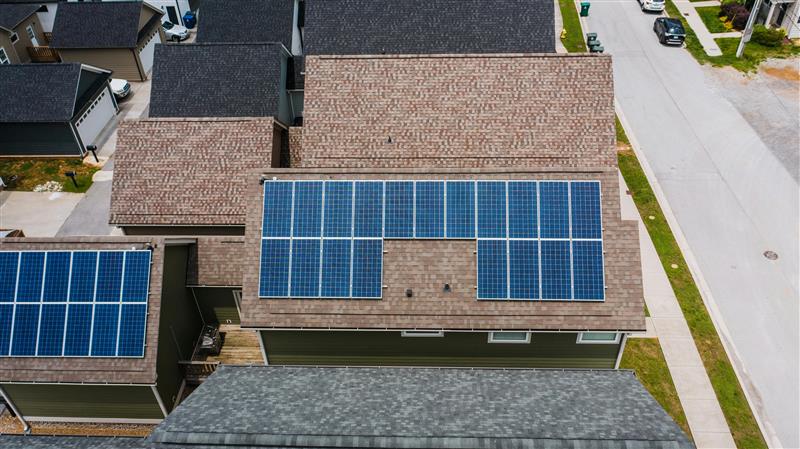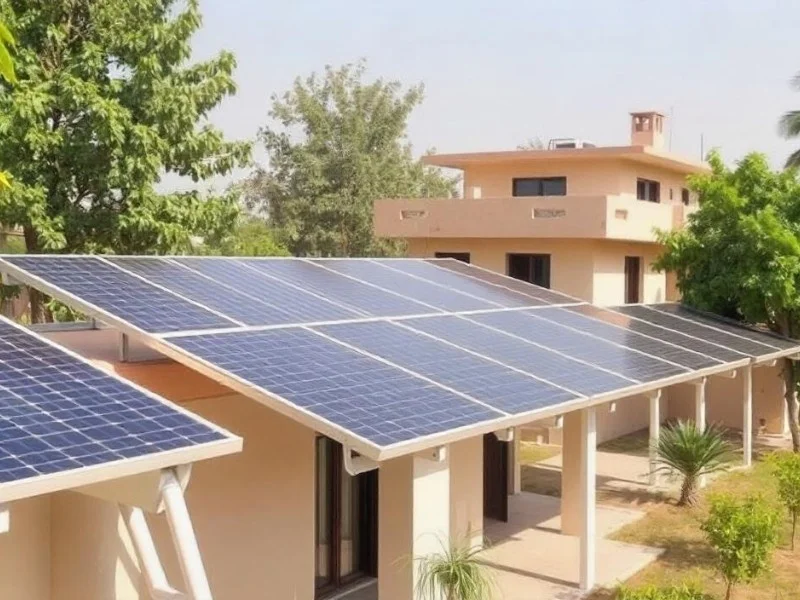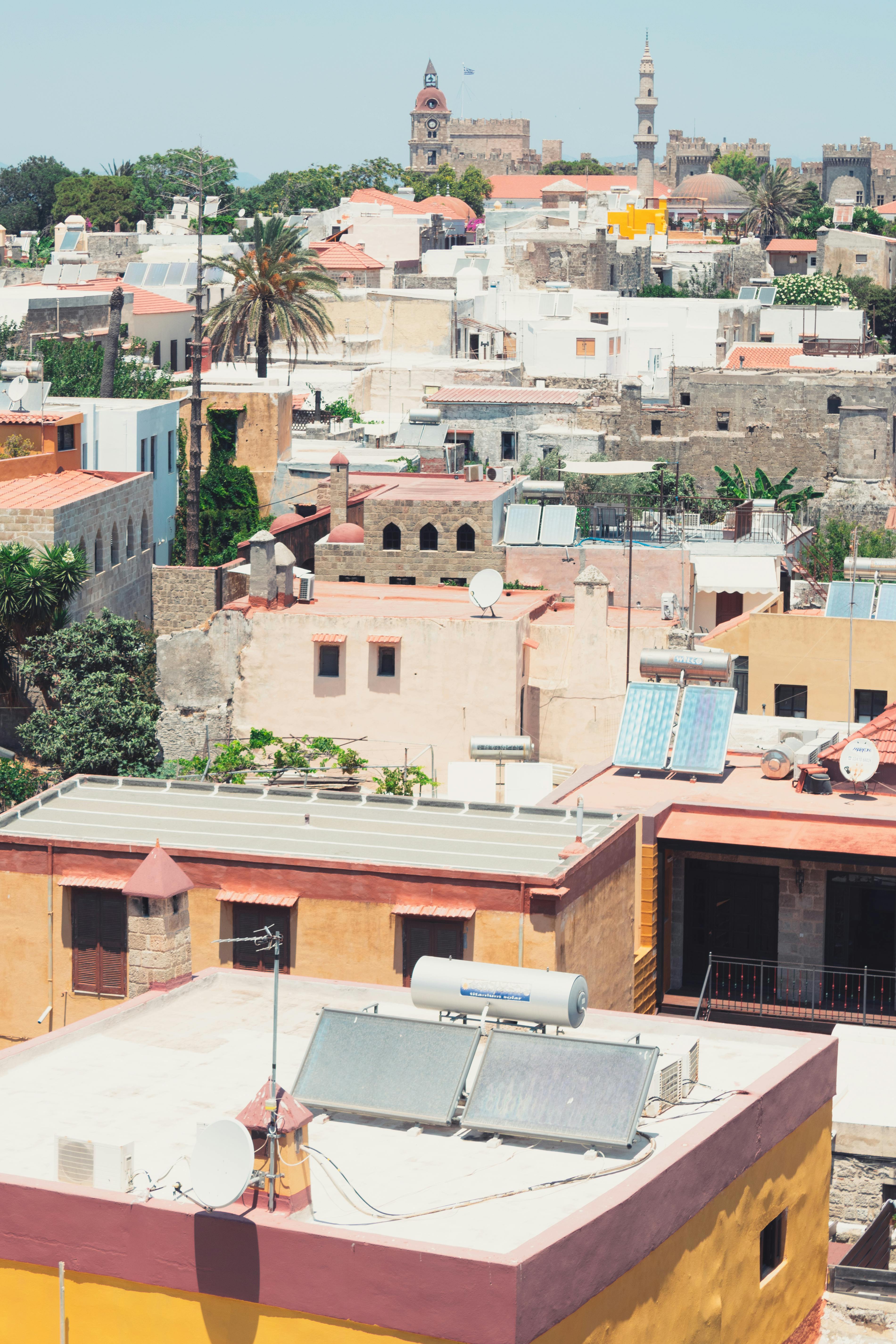A 1-kW solar rooftop plant is the minimum size of solar plant that can be installed under Net Metering. 1kW is usually sufficient for an average household and where the rooftop area is also limited. To install a 1-kW system, you will need less than 8 square meters (approximately 86 square feet) of shadow-free area.
Let us understand the number of solar panels required for 1 kW plant. Considering a 540Wp monocrystalline solar panel, we will need 2 panels, which makes our DC capacity 1080 Wp or 1.08 kWp. In case of smaller panels of rating say 450Wp, you will need 3 panels to make the capacity of 1350Wp or 1.35kWp.
A solar panel is made of 72 cells or 144 half cut cells made of silicon arranged in series and parallel combination and connected via silver ribbons.
Monocrystalline Technology: Each cell in these panels is made up of a single silicon crystal and is more efficient as compared to the polycrystalline and thin film cells.
A 540Wp rated solar panel will generate a maximum power of 540W at peak hours.
Also, it is important to note that this is the maximum output that the plant can provide during peak hours, the output will vary as per the irradiation during the day.
So, for a 1.08 kWp plant, a 1-kWinverter is recommended. It is more likely that you might have a single-phase connection, in that case your EPC company will suggest a 1 kW single phase inverter.
What appliances can a 1kWp rooftop solar plant support?
Since we are suggesting an On-Grid system, all your appliances can run simultaneously without any trouble. As the name says, the On-Grid system is connected to the grid i.e. your electricity supplier, hence the system can take the entire connected load.
How does the 1kWp rooftop On-Grid solar plant support all the household appliances?
A grid-connected rooftop solar plant is connected to your main distribution board and relies on the grid for voltage reference to synchronize the inverter. This synchronization ensures the generated electricity matches the grid's frequency (50Hz in India) and voltage, allowing safe power supply to appliances. This means, the appliances in the house have access to electricity from the solar plant as well as the grid. Hence, you can run your appliances simultaneously as well, say television and any other appliance like washing machine along with the lights and fans.
If the rooftop solar power plant is unable to suffice the demand say due to cloudy weather or at night, the electricity is supplied from the grid and when the generation from the solar power plant exceeds the consumption, the units are exported to the grid. This mechanism of importing and exporting electricity is possible under the Net-Metering mechanism.
What are the Components required in a 1kW rooftop solar plant?
Pricing
A 1-kW rooftop solar plant can cost you somewhere between Rs. 70,000- 80,000. The prices may vary depending on the type and rating of solar panel used, solar module mounting structure used and, any other additions.
Subsidy
The PM – Surya Ghar: Muft Bijli Yojana offers subsidy to residential rooftop owners to install rooftop solar plants. Here is how the subsidy will work
- Rs. 30,000/- per kW up to 2 kW
- Rs. 18,000/- per kW for additional capacity upto 3 kW
- Total Subsidy for systems larger than 3 kW capped at Rs 78,000
Here In the case of a 1kW system, you can expect a subsidy of Rs. 30,000/- from the central government.
For subsidy, the consumer will have to log on to the National portal i.e. https://pmsuryaghar.gov.in and fill in the required details and upload the necessary documents. Once the rooftop solar plant is commissioned and the DISCOM approves all the documents, the subsidy will be deposited to the consumer’s bank account which was filled during the submission of the form.
For commercial and industrial consumers, subsidies are not applicable.
Financing options: There are banks and financing institutions that offer collateral-free loans for up to 90%of the project cost. Also, it is possible to take a loan even if you are opting for a subsidy. Hence, the upfront capital is not a major concern to install a rooftop solar plant.
How many units does a 1kW rooftop solar plant generate?
While generation varies as per location, tilt angle and orientation of the solar panel, etc. one can expect a 1kWp rooftop solar plant to generate ~120 units/month or ~1440 units/year.
How much will the electricity bill be reduced after installing the rooftop solar plant?
While the reduction in bill depends on your consumption, we can estimate savings based on solar generation. Considering an average tariff of Rs.5/kWh for a residential consumer, One can expect a saving of ~Rs.600/month considering an average generation of 120 units/month. In most cases, the electricity bill will be reduced to zero. However, fixed charges based on the contract demand will be still applicable.
What is the timeline to install a 1kW rooftop solar plant?
Once all the components are delivered to the site, the rooftop solar plant should ideally be installed in 1-2 days, as it involves only 2-3 panels. In case of a quick and efficient installer, installation can be finished in few hours. However, the solar plant’s commissioning (i.e. the day you can realistically start using solar power) entirely depends on the net-metering approvals from the DISCOM might take 15-20 days.
Can I increase the size of the rooftop solar plant in the future?
The capacity of the rooftop solar plant is based on 3 factors:
- Electricity consumption
- Rooftop space available
- Sanctioned load
You can increase the size of the plant in the future if:
- If your consumption has increased and you need more than 120 units in a month, capacity.
- If you have enough rooftop space to accommodate another 2-3kW
- If the sanctioned load is more than 1kW, if not you can apply for loan enhancement with the electricity supplier/DISCOM.
Having said that, if you have adequate space and sanctioned load, it’s wise to opt fora larger system, such as 2-3 kW (depending on your consumption), right from the start, rather than increasing the size later on.
Expanding the rooftop solar plant will require either adding a new inverter or replacing the existing one, along with other components like structures and cables. Choosing a larger system initially is usually more cost-effective than scaling up later. Additionally, keep in mind that the subsidy can only be claimed once. So, if you plan to add more rooms or appliances in the near future, consider investing in a higher capacity system upfront.
Is it difficult to maintain a 1-kW rooftop solar plant?
Rooftop solar plants generally require minimum maintenance. Ideally, the EPC company should provide 1-year of AMC with quarterly technical visits and any emergency visit in case of a breakdown. Apart from this bi-monthly or monthly cleaning of solar panels with water is recommended to clean dust, and dirt deposited on the panels.
And what about Hybrid and Off-Grid systems? Should we consider them while finalizing our rooftop solar plant? And what is the price in both cases?
We would always recommend an On-Grid system considering the affordability and no hassle subsidy, especially if the rooftop solar plant is to be installed in areas with minimal or no power cuts.
Let us briefly understand both cases:
Hybrid: This is a great solution when there are frequent power cuts, this ensures a reliable supply of electricity. Subsidy can be availed in case of Hybrid systems as well, but it will be subject to approval by the respective Electricity Regulatory Commissions. A typical Hybrid 1 kW rooftop system can cost around Rs. 1,20,000-1,50,000 and a maximum subsidy of Rs. 30,000 can be considered for it.
Off-grid System: This system is only recommended where there is absolutely no access to electricity say in a remote hill station/town. Although with an off-grid system, you won’t be able to opt for subsidy. A 1 kW Off-grid system can cost you around Rs. 80,000-90,000 and can vary depending on the load.
We hope this article clarifies your questions about a 1-kW rooftop solar plant. You can write to us connect@aerem.co for any questions and queries about rooftop solar installation and solar finance needs.

.webp)
.webp)
.webp)





.jpg)
.jpg)






.jpg)





.jpeg)











.jpg)


.png)
.png)
.png)
.png)
.png)
.png)


.png)


.jpg)
